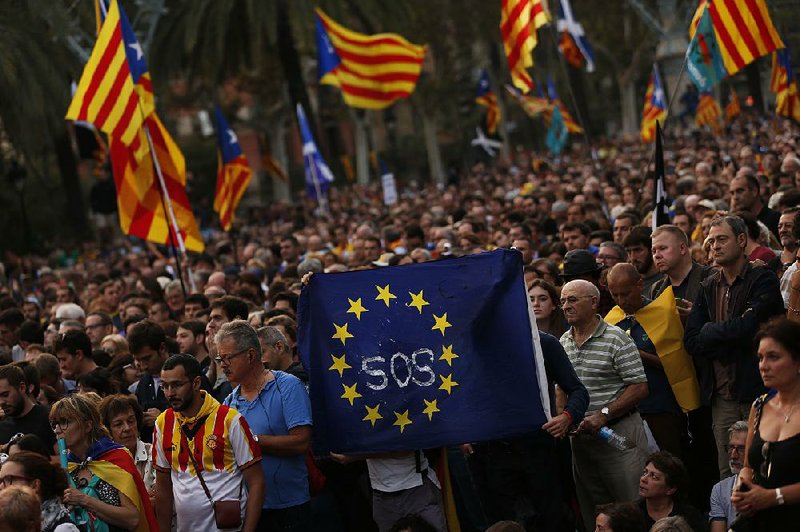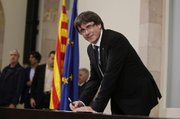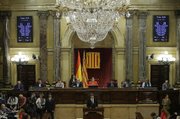BARCELONA, Spain -- Catalan separatists on Tuesday signed what they called a declaration of independence from Spain, though the Catalonia region's president said he would delay implementing it for several weeks while he seeks talks with the government in Madrid.
Spain, however, called an emergency Cabinet meeting for today and gave little indication it is willing to talk.
Regional President Carles Puigdemont said the landslide victory in an Oct. 1 referendum gave his government the grounds to implement its long-held desire to break century-old ties with Spain.
"Today I assume the mandate for Catalonia to become an independent state in the form of a republic," Puigdemont said to cheers from the packed assembly on Tuesday evening, with Catalan police deployed around the parliament perimeter.
But he refused to begin the process of secession, proposing instead that the regional parliament "suspend the effects of the independence declaration to commence a dialogue, not only for reducing tension but for reaching an accord on a solution to go forward with the demands of the Catalan people."
"We have to listen to the voices that have asked us to give a chance for dialogue with the Spanish state," Puigdemont said.
Puigdemont's distinctions of authority, days after saying his government would send the issue for a vote in the regional parliament "where the sovereignty of our people lies," left many Catalans confused.
"Let's see if I've understood this well," Miquel Iceta, the leader of the Catalan branch of the Socialist party, told Puigdemont during the parliamentary session. "You're taking on a mandate that I'm questioning, and at the same time you're proposing to suspend a declaration that hasn't been made."
The central government in Madrid said it did not accept the declaration of independence by the separatists and did not consider the referendum or its results to be valid.
The Catalan leader "doesn't know where he is, where he is going and with whom he wants to go," Spanish Deputy Prime Minister Soraya Saenz de Santamaria said.
Puigdemont was the first to sign the document titled "Declaration of the Representatives of Catalonia." Dozens of other lawmakers signed it after him.
In his remarks to the parliament, Puigdemont was critical of the Spanish government's response to the referendum and the violent police reaction that left hundreds of people injured on voting day, but he said Catalans have nothing against Spain or Spaniards.
"We are not criminals, we are not crazy, we are not pulling off a coup, we are not out of our minds. We are normal people who want to vote," he said.
Opposition leader Ines Arrimadas of the Citizens party slammed the speech.
"This is a coup. Nobody has recognized the result of the referendum. Nobody in Europe supports what you have just done," she said.
"Stop saying the Catalan people are united. ... You have forced us to turn against one another," she said, addressing Puigdemont. "The majority of Catalans feels they are Catalans, Spanish and European. ... We won't let you break our hearts into bits."
In Brussels, European Council President Donald Tusk pleaded directly with the Catalan leadership ahead of the speech not to issue a divisive call for independence.
"I ask you to respect in your intentions the constitutional order and not to announce a decision that would make such a dialogue impossible," he said.
A full declaration of secession -- or an outright proclamation of a new Catalan republic -- would have been met with fierce opposition by central Spanish authorities, who could take the unprecedented step of suspending the self-government of Catalonia and taking over some or all powers in the region.
Puigdemont also could be called in for questioning in court and possibly arrested.
Some 2.3 million Catalans -- or 43 percent of the electorate in the northeastern region -- voted in the referendum. Regional authorities say 90 percent were in favor and declared the results valid. Those who opposed the referendum had said they would boycott the vote.
The government of Spanish Prime Minister Mariano Rajoy had repeatedly refused to grant Catalonia permission to hold a referendum on the grounds that it was unconstitutional, since it would only poll a portion of Spain's 46 million residents.
Catalonia's separatists camp has grown in recent years, strengthened by Spain's recent economic crisis and by Madrid's rejection of attempts to increase self-rule in the region.
The political deadlock has plunged Spain into its deepest political crisis in more than four decades, since democratic rule was restored after the dictatorship of Gen. Francisco Franco.
Thousands rallied in Barcelona's streets and watched Puigdemont's speech. For some, his move to not declare outright secession was disappointing.
"I feel a little sad because now is not independence," said 55-year-old Maria Gill. "We must wait a few weeks, a few weeks we must talk with the government of Spain."
Others took a more stoic approach.
"Perhaps it isn't the decisive declaration, declaring the republic and breaking away [from Spain] from today before any negotiation," said Oscar Baldes. "But it's a first step, and that's important."
Information for this article was contributed by Aritz Parra, Joseph Wilson, Hernan Munoz and Ciaran Giles of The Associated Press; by Raphael Minder and Patrick Kinglsey of The New York Times; and by Esteban Duarte, Charles Penty, Sharon Smyth, Maria Tadeo, Todd White, Angeline Benoit and Thomas Gualtieri of Bloomberg News.
A Section on 10/11/2017


